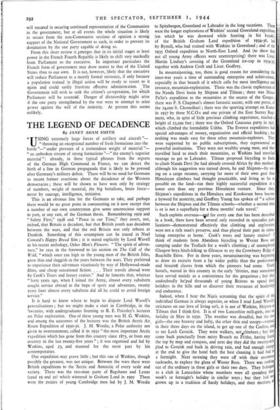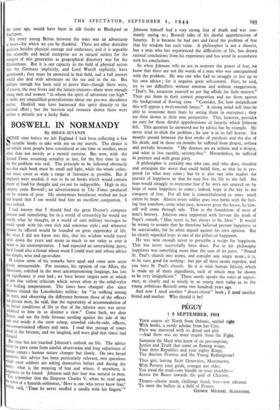THE LEGEND OF DECADENCE
By JANET ADAM SMITH
" USING extremely large forces of artillery and aircraft "— " throwing an exceptional number of fresh formations into the battle "—" under pressure of a tremendous weight of material "- " an unbroken stream of strong formations "—" the enemy's superior material ": already, in these typical phrases from the reports of the German High Command in France, we can detect the birth of a line in German propaganda that is likely to be pressed after Germany's military defeat. There will be no need for Germans to recant former assertions about the decadence of the Western democracies ; these will be shown to have won only by strategy of numbers, weight of material, the big battalions, brute force— never by courage, intelligence, initiative.
This is an obvious line for the Germans to take, and perhaps there would be no great point in commenting on it now except that a number of our own countrymen give some unconscious support to part, at any rate, of the German thesis. Remembering 1929 and " Safety First," 1938 and " Peace in our Time," they assert, not, indeed, that Britain is decadent, but that British youth was decadent between the wars, and that the real Britain was only reborn at Dunkirk. Something of this assumption can be traced in Noel Coward's Happy Breed film ; it is stated explicitly by Lord Wavell in his recent anthology, Other Men's Flowers. "The spirit of adven- ture," he says in the foreword to his section on The Call of the Wild, "which once ran high in the young.men of the British Isles, grew thin and sluggish in the years between the wars. They preferred to experience their adventure vicariously by way of Hollywood-made films, and cheap sensational fiction. .. . Their travels abroad were by Cook's Tours and luxury cruises." And he laments that, whereas " forty years ago, when I joined the Army, almost every subaltern sought service abroad in the hope of sport and adventure, twenty years later almost every subaltern did all he could to avoid foreign service."
It is hard to know where to begin to dispute Lord Wavell's generalisations ; but we might make a start in Cambridge, in the 'twenties, with undergraduates listening to R. E. Priestley's lectures on Polar exploration. One of these young men was H. G. Watkins, and among the outcomes of the lectures was the British Arctic Air. Route Expedition of 1930-31. J. M. Wordie, a Polar authority not given to overstatement, called it in 1932 " the most important Arctic expedition which has gone from this country since 1875, or from any country in the last twenty-five years " ; it was organised and led by Watkins, aged 23, and manned for the most part by his contemporaries.
One expedition may prove little ; but this one of Watkins, though possibly the greatest, was not unique. Between the wars there were British expeditions to the 'Arctic and Antarctic of every scale and variety. There was the two-man party of Bagshawe and Lester (aged 19 and 20) which wintered in Graham Land in 1920 There were the panics of young Cambridge men led by J. M. Wordie
to Spitzbergen, Greenland or Labrador in the long vacations. There were the longer explorations of Watkins' second Greenland expedition (on which he was drowned while hunting in his kayak); of the British Graham Land expedition of 1934-36, led by Rymill, who had trained with Watkins-in Greenland ; and of the 1935 Oxford expedition to North-East Land. And (to show that not all young Army officers were unenterprising) there was Lieut. Martin Lindsay's crossing of the Greenland ice-cap in 1934-35, together with Andrew Croft and Lieut. Godfrey.
In mountaineering, too, there is good reason for considering the inter-war years a time of outstanding enterprise and achievement,
especially in that branch of it which calls for most intelligence and resource, mountain-exploration. There was the classic exploration of the Nanda Devi basin by Shipton and Tilman ; there was Marco Pallis's expedition to the mountains at the source of the Ganges ; there was F. S. Chapman's almost fantastic ascent, with one porter, of the 24,000 ft. Chomolhari ; there was the sporting'attempt on Kamet in 1937 by three N.C.O.s and one private of the East Surrey Regi- ment, who, in spite of little previous climbing experience, reached a height of 23,500 feet ; there was the Oxford Caucasus party in 1937, which climbed the formidable Ushba. The Everest expeditions had special advantages of money, organisation and official backing ; but nothing was made easy for these other mountain-explorers. They were supported by no public subscriptions, they represented no powerful institutions. They were not wealthy young men, and they travelled hard to reach their mountains, as Watkins had travelled steerage to get to Labrador. Tilman proposed- bicycling to India to climb Nanda Devi (he had already crossed Africa by this method); although his suggestion was turned down, he and Shipton—by sail- ing on a cargo steamer, carrying far more of their own gear than Himalayan climbers had thought practicable, and living as far as possible on the land—ran their highly successful expedition at a
lower cost than any previous Himalayan venture. Since then, Shipton's expeditions in the Himalaya and Karakoram have become a byword for austerity, and Geoffrey Young has spoken of " a schism between the Shipton and the Tilman schools—whether a second shirt is or is not a superfluity for a three months' rude travel."
Such exploits overseas—vd for every one that has been described in a book, there have been several only recorded in specialist pub• lications—demonstrated effectively that climbing and exploration were not a rich man's preserve, and thus played their part in stimu- lating enterprise at home.' Cook's tours and luxury cruises? I think of students from Aberdeen bicycling to Wester Ross and camping under the Teallach for a week's climbing ; of unemployed Glasgow boys hitch-hiking to Glencoe to try the Crowberry Ridge d Buachille Etive. For in these years, mountaineering was beginning
to draw its recruits from a far wider public than the professional and leisured classes from which the pioneers had come. Youth hostels, started in this country in the early 'thirties, may sometimes have served mainly as a convenience for the gregarious ; but they undoubtedly helped thousands of young Britons to spend their holidays in the hills and so discover their resources of leadership and endurance.
Indeed, when I hear the Nazis screaming that the spirit of the individual German is always superior, or when I read Lord Wavell's strictures on our love of living soft, it is not of Watkins, Shipton Of Tilman that I think first. It is of two Lancashire mill-girls, met on holiday in Skye in 1930. The weather was dreadful, but the mu girls—the one brawny and hefty, the other thin and stoopy—wanted, in their three days on the island, to get up one of the Coolins, and to see Loch Coruisk. They were walkers, notoclimbers ; but they came back punctually from misty Bruach na Frithe, having found the top by map and compass, and next day they did the twenty-11111c plod to Coruisk and back in driving rain, and had enough energy at the end to give the hotel bath the best cleaning it had had in a fortnight. Next morning they were off with their enormous rucksacks, to explore the glens of Wester Ross. There was nothing out of the ordinary in these girls or their two days. They belonged to a club in Lancashire whose members were all spending the week's or fortnight's holiday in similar ways ; but they had tot grown up to a tradition of hardy holidays, and their mothers, el the same age, would have been in silk frocks at Blackpool or Southport.
Not every young Briton between .the wars was an adventurer at heart—for which we can be thankful. There are other desirable qualities besides physical courage and endurance, and it is arguable that scientific and social enterprise are as natural outlets for the energies of this generation as geographical discovery was for the Elizabethans. But it is our capacity in the field of physical action that the Germans implicitly, and Lord Wavell explicitly, have questioned ; they must be answered in that field, and a full answer would also deal with adventure on the sea and in the air. But perhaps enough has been said to prove that—though there were, of course, the easy livers and the luxury-cruisers--there were enough young men and women " in whom the spirit of adventure ran high " t(' make any unqualified generalisations about our pre-war decadence untrue. Dunkirk may have harnessed this spirit directly to the national effort ; but the heroism and resource shown there were neither a miracle nor a lucky fluke.



























 Previous page
Previous page